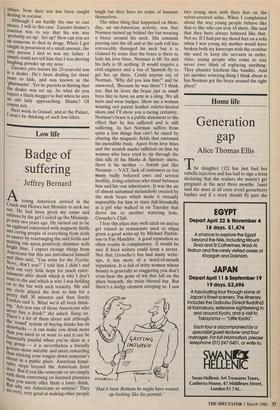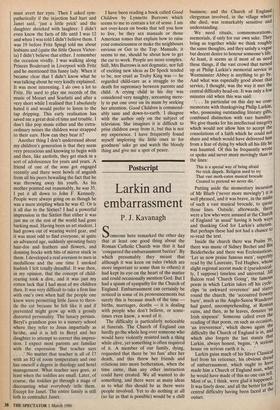Home life
Generation gap
Alice Thomas Ellis
The daughter (12) has just had her rubella injection and has had to sign a form declaring that she realises she mustn't get pregnant in the next three months. Janet said she must at all costs avoid gooseberry bushes and if a stork should fly past she must avert her eyes. Then I asked sym- pathetically if the injection had hurt and Janet said, 'just a little prick' and the daughter shrieked with laughter. I didn't even know the facts of life until I was 12 and when I was told I didn't believe them. I was 19 before Fritz Spiegl told me about lesbians and (quite the little Queen Victor- ia) I didn't believe that either. I remember the occasion vividly. I was walking along Princes Boulevard in Liverpool with Fritz and he mentioned this funny lady. When it became clear that I didn't know what he was talking about he very kindly explained. It was most interesting. I do owe a lot to Fritz. He used to play me records of the music of Mozart and Scarlatti and after a very short while I realised that I absolutely hated it and would prefer to listen to the tap dripping. This early realisation has saved me a great deal of time and trouble. I don't like pop music either and the extra- ordinary noises the children wear strapped to their ears. How can they bear it?
Another thing I don't understand about my children's generation is that they seem very precocious and knowing to begin with and then, like axolotls, they get stuck in a sort of adolescence for years and years. A friend of one of the sons got engaged recently and there were howls of anguish from all his peers bewailing the fact that he was throwing away his youth. As his mother pointed out reasonably, he was 35. I put it all down to John F. Kennedy. People were always going on as though he was a mere stripling when he was 42. Or is it all due to the Sixties? I had a powerful impression in the Sixties that either it was just me or the rest of the world had gone barking mad. Having been an art student, I had grown out of wearing weird gear, and it was most odd to find everyone, at quite an advanced age, suddenly sprouting fuzzy hair-dos and feathers and flowers, and donning frocks with bits of mirror stuck in them. I developed a real aversion to men in medallions and the one time I smoked hashish I felt totally dreadful. It was then, in my opinion, that the concept of child- rearing took a dive, and it was just my rotten luck that I had most of my children then. It was very difficult to take a firm line with one's own when half the people one knew were permitting little Jason to throt- tle the cat because he felt like it and if prevented might grow up with a grossly distorted personality. The lunacy persists. Beryl's grandson goes to a nursery school where they refer to Jesus impartially as he/she, and it is left to Beryl and her daughter to attempt to correct this impres- sion. I expect most parents are familiar with the expression 'But teacher says . . . .' No matter that teacher is all of 17 with an IQ of room temperature and one has oneself a degree in theology and hotel management. What teacher says goes, at least when the toddies are small. Later, of course, the toddies go through a stage of discounting what everybody tells them. Except for Janet. The entire family is still loth to contradict Janet. I have been reading a book called Good Children by Lynnette Burrows which seems to me to contain a lot of sense. I am not over-keen on books that tell you how to live, be they sex manuals or those American tomes that explain how to raise your consciousness or make the neighbours envious or Get to the Top. Manuals, it seems to me, should be about how to get the car to work. People are more complex. Still, Mrs Burrows is not dogmatic, nor full of exciting new ideas as Dr Spock tended to be, nor cruel as Truby King was — he regarded child-care as a struggle to the death for supremacy between parents and child. A crying child in his day was considered very naughty, screaming mere- ly to put one over on its mum by seeking her attention. Good Children is commend- ably sane and down-to-earth. I disagree with the author only on the subject of television. She imagines it is difficult to prise children away from it, but this is not my experience. I have frequently found myself imploring the little ones to for goodness' sake go and watch the bloody thing and give me a spot of peace.















































 Previous page
Previous page